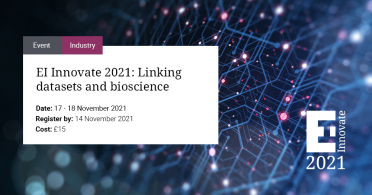Three exciting trends in genomics and data science
Explore how synthetic biology, AI and systems-based omics approaches are driving innovation through linking datasets and bioscience - at EI Innovate.
We live in the digital era, an age of information in which data is our most valuable currency.
At EI Innovate 2021, we’re exploring three key themes at the heart of innovation in data-driven bioscience research: how synthetic biology, artificial intelligence and multi-omics approaches are powering biotechnology, drug discovery and personalised medicine.
Living things are the source of most of our medicines and other rare and valuable molecules such as fragrances and flavourings. Synthetic biology - applying the principles of engineering to the study of life - is unlocking the potential of living things as factories to produce all of these more sustainably. Thanks to the development of standardised molecular parts, the declining cost of DNA sequencing and synthesis, and tremendous computational power, the global synthetic biology industry is set to grow to a worth of $30 billion in the next five years.
At Earlham, we identify the genetic basis of chemical diversity and apply synthetic biology approaches to enable the biomanufacturing of rare and valuable molecules. Equipped with a state-of-the-art biofoundry, we also partner with collaborators across Norwich Research Park - home to several biotechnology companies such as Tropic Biosciences, Colorifix and Leaf Expression Systems.
At EI Innovate this year, you can explore examples of gene discovery from plants, photosynthetic biomanufacturing of therapeutics and sex pheromones for controlling insect pests of agriculture, and how bioengineered microbes are being used to reduce the environmental impact of the textile industry.

In the last decade there has been an explosion in the size and complexity of biological data, driven by innovations in imaging, measurement techniques and DNA sequencing. We are now tasked with deciphering these data sets ‘at scale’, but due to a lack of tools and skilled personnel we face somewhat of a bottleneck. Artificial intelligence (AI) describes the multitude of techniques, including machine learning, adopted by computer and data scientists to automate and massively speed up key steps in research - reducing bias and, crucially, suggesting connections that may have escaped the human mind.
At the Earlham Institute and the John Innes Centre, researchers have been developing machine learning tools to advance plant science. Examples include an image-based analysis project with global seed giant Syngenta to enable automated screening of seed germination, which vastly reduces manual labour and error. More recently, machine learning algorithms have been developed to understand gene expression patterns in crops and to explore complex new biochemical synthesis pathways.
At EI Innovate this year, we will showcase a collaboration between the Norwich Bioscience Institutes and the Alan Turing Institute aiming to advance the application of machine learning and AI in plant research. We will also demonstrate the power of AI to characterise the circadian rhythms of plants, understand how genetic changes affect plant structure and influencing crop yield, and identify mechanisms used by plant pathogens to invade plants.

The increasing understanding of the importance of the gut microbiome may well turn out to be one of the greatest medical breakthroughs of the last few decades. As the technology to sequence and identify the complex microbial communities living within us improves by the year, so does the potential for this information to help us improve human lives and lifespan. The UK has a strong position in the science of the microbiome, especially as it relates to human health and wellness, underpinned by strong expertise in genomics and systems biology approaches.
At the Earlham Institute and Quadram Institute, researchers study the human microbiome and drive advances in metagenomic sequencing using platforms such as the Oxford Nanopore MinION. Combining big data with multi-omics, systems-based approaches, the research aims to boost gut health and enable personalised microbiome treatments.
At EI Innovate, you are invited to explore how we identify and profile microbiomes using nanopore sequencing, bioinformatics approaches, multi-omics analysis, network biology and systems medicine - with examples of applications in oral health and the human gut. We will discuss how access to data can facilitate personalised approaches, standards in analysis, and open access to collaborations between academia, industry and health organisations.

This year EI Innovate 2021 will showcase examples of collaborations across 3 research institutes on the Norwich Research Park, Earlham Institute, John Innes Centre, and Quadram Institute, which are strategically funded by UKRI-BBSRC to deliver innovative, world-class bioscience research and training, leading to wealth and job creation, generating high returns for the UK economy.
Each year, we focus on specific areas of expertise and examples of our collaborations. The theme of EI Innovate 2021 is “Linking datasets and Bioscience” and we will explore how data-driven approaches can unlock new biological understanding and development of new technologies and applications.
